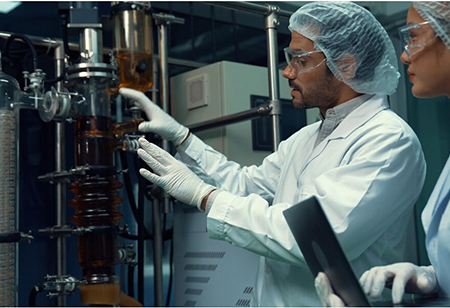Hridkamal Roy, Assistant Editor, India Pharma Outlook

New manufacturing standards have been imposed on pharmaceutical companies by the government in order to address the safety and quality related concerns associated with drugs. These have been rolled out in the wake of deaths that have taken place overseas since 2022 thus emphasizing on increased scrutiny of the Indian pharmaceutical industry that’s worth 50 Bn USD. It is poised to grow to 130 Bn USD by the end of 2030 according to media reports but several challenges still exist that are hindering the progress. Challenges on the grounds of licensing and regulatory compliance, pricing control mechanisms, counterfeit drugs and dependence on other countries for APIs are clearly evident in this regard.
The guidelines were passed down through a notification by the Union Health Ministry which informed that all manufacturers are solely responsible for the quality of products and “they are fit for their intended use, comply with the requirements of the license and do not place patients at risk due to inadequate safety, quality or efficacy”.
Only staying abreast with the challenges involved in manufacturing of pharmaceuticals is not enough to become sustainable in the market. A company must also execute definitive business strategies in order to overcome the aforementioned challenges.
174 USFDA Inspections were faced by the Indian pharmaceutical manufacturers that accounted for 14 percent of the total number of inspections done that year across the globe. Since then, these inspections have become a norm for companies. Because India is gradually becoming one of the popular pharmaceutical exporters and has 12 percent of the total manufacturing units that exports products to the US, these inspections become inevitable. Many warning letters have been issued by the FDA on the ground of Drug GMP and with every letter there was significant impact on the share prices and overall image of pharmaceutical companies. In 2019, the number of plant audits by the FDA was 239, the highest recorded in history.
In order qualify for the FDA standards the Indian pharmaceutical manufacturers should first look at investing on compliant infrastructures that are at par with the Drug GMP standards. To give an example, Siemens Healthineers offers a gamut of products and services primarily directed towards ensuring the compliance and efficiency guidelines for pharmaceutical manufacturing processes. These include automation and digitalization solutions, as well as quality management systems specifically designed to meet all regulatory standards and streamline workflows for production.
Stringent control over pricing of drugs has become one of the reasons why pharmaceutical manufacturing is facing problems regarding innovation and drug discovery. Apparently, it would seem that this initiative by the government is upholding consumer requirements by providing medicines at cheaper prices but it becomes a hurdle for manufacturers in the path of innovation and R&D. With all the pricing control mechanisms levied by the government upon pharmaceutical manufacturers, they are unable to march forward with growing complexities regarding ROI.
In this regard, companies must first focus on portfolio diversification which involves the distribution of both controlled and non-controlled products. This helps in balancing the impact of price controls imposed by the government with respect to the gross revenue generated. High production and sales of generic medicines can also act as a solution to this problem. Many companies are focused on development of generic drugs which keeps them abreast with pricing regulations and are able to maintain profitability through high volume distribution.
“The government has invested a lot in policies enabling pharmaceutical companies to manufacture locally. This has benefited the Indian generic companies greatly because many complex products that were earlier only manufactured in other countries and had to be imported are now being manufactured locally. As a result, companies can now work with regional CDMOs to get full access to those products, control the supply chain, cut operational costs, and then pass on this cost benefit to patients”, mentioned Akhil Ravi, CEO, Aurigene Pharmaceutical Services Limited.
In this regard, IQVIA helps pharmaceutical manufacturers monitor pricing and reimbursement regulations imposed by governments across the world. The process involves analysis of market dynamics, conduction of pricing research, and development of strategies for optimization of prices while ensuring compliance with the regulations.
The FDA had blacklisted 30 generic drugs of a leading pharmaceutical manufacturer of India which also happens to be one of the largest generic medicine companies in the world because the production failed to adhere to the Drug GMP. These drugs were being manufactured at two of the company’s units. Later, the Mashelkar Committee conducted research on the growth of spurious drugs in India and concluded that 35 per cent of the counterfeit drugs that manufactured across the world are produced in India itself.
In order to address this challenge, pharmaceutical manufacturers can make use of advanced trace and track technologies to create identifiers for products that will be spread across the whole supply chain and create authenticity. The Indian pharmaceutical manufacturers should also close associate with regulatory authorities like Central Drug Standard Control Organization (CDSCO) in order to create guidelines and regulations that can be imposed to combat the growth of counterfeit drugs in the market.
To give an example, Sproxil can be said as a global leader in anti-counterfeiting and brand protection solutions. The company is equipped with a mobile authentication platform that allows consumers to verify the authenticity of pharmaceutical products with the use of mobile phones.
If pharmaceutical companies are able to implement the above measures for innovation, drug discovery and development, it will have a positive impact on the overall healthcare sector of the nation. These will ensure safe production of medicines and will leave no room for the growth of counterfeit drugs.